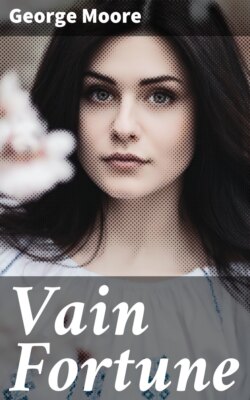Читать книгу Vain Fortune - George Moore - Страница 7
На сайте Литреса книга снята с продажи.
V
ОглавлениеTable of Contents
There was much prophecy abroad. Stiggins' words, 'The piece never did, and never will draw money,' were evidently present in everybody's mind. They were visible in Ford's face, and more than once Hubert expected to hear that—on account of severe indisposition—Mr. Montague Ford has been obliged to indefinitely postpone his contemplated revival of Mr. Hubert Price's play Divorce. But, besides the apprehension that Stiggins' unfavourable opinion of his enterprise had engendered in him, Ford was obviously provoked by Hubert's reluctance to execute the alterations he had suggested. Night after night, sometimes until six in the morning, Hubert sat up considering them. Thanks to Ford's timely advance he was back in his old rooms in Fitzroy Street. All was as it had been. He was working at his play every evening, waiting for Rose's footsteps on the stairs. And yet a change had come into his life! He believed now that his feet were set on the way to fortune—that he would soon be happy.
He stared at the bright flame of the lamp, he listened to the silence. The clock chimed sharply, and the windows were growing grey. Hubert had begun to drowse in his chair; but he had promised to rewrite the young girl's part, Ford having definitely refused to intrust Rose with the part of the adventuress. He was sorry for this. He believed that Rose had not only talent, but genius. Besides, they were friends, neighbours; he would like to give her a chance of distinguishing herself—the chance which she was seeking. All the time he could not but realise that, however he might accentuate and characterise the part of the sentimental girl, Rose would not be able to do much with it. To bring out her special powers something strange, wild, or tragic was required. But of what use thinking of what was not to be? Having made some alterations and additions he folded his papers up, and addressed them to Miss Massey. He wrote on a piece of paper that they were to be given to her at once, and that he was to be called at ten. There was a rehearsal at twelve.
On the night of the first performance, Hubert asked Rose to dine in his rooms. Mr. Wilson proposed that they should have a roast chicken, and Annie was sent to fetch a bottle of champagne from the grocer's. Annie had been given a ticket for the pit. Mrs. Wilson was going to the upper boxes. Annie said—
'Why, you look as if you was going to a funeral, and not to a play. Why don't ye laugh?'
In truth, Hubert and Rose were a little silent. Rose was thinking how she could say certain lines. She had said them right once at rehearsal, but had not since been able to reproduce to her satisfaction a certain effect of voice. Hubert was too nervous to talk. There was nothing in his mind but 'Will the piece succeed? What shall I do if it fails?' He could give heed to nothing but himself, all the world seemed blotted out, and he suffered the pain of excessive self-concentration. Rose, on the other hand, had lost sight of herself, and existed almost unconsciously in the soul of another being. She was sometimes like a hypnotised spectator watching with foolish, involuntary curiosity the actions of one whom she had been bidden to watch. Then a little cloud would gather over her eyes, and then this other being would rise as if out of her very entrails and recreate her, fashioning her to its own image and likeness.
She did not answer when she was spoken to, and when the question was repeated, she awoke with a little start. Dinner was eaten in morbid silence, with painful and fitful efforts to appear interested in each other. Walking to the theatre, they once took the wrong turning and had to ask the way. At the stage door they smiled painfully, nodded, glad to part. Hubert went up to Montague Ford's room. He found the comedian on a low stool, seated before a low table covered with brushes and cosmetics, in front of a triple glass.
'My dear friend, do not trouble me now. I am thinking of my part.'
Hubert turned to go.
'Stay a moment,' cried the actor. 'You know when the husband meets the wife he has divorced?'
Hubert remembered the moment referred to, and, with anxious, doubting eyes, the comedian sought from the author justification for some intonations and gestures which seemed to him to form part and parcel of the nature of the man whose drunkenness he had so admirably depicted on his face.
'"This is most unfortunate, very unlucky—very, my dear Louisa; but——"
'"I am no longer obliged to bear with your insults; I can now defend myself against you."
